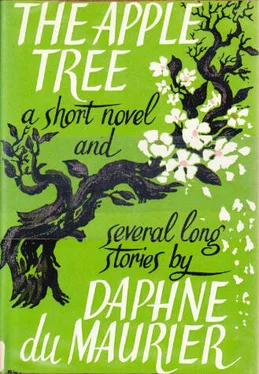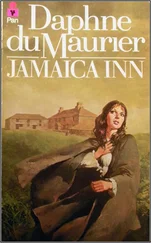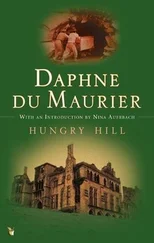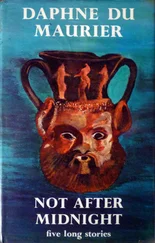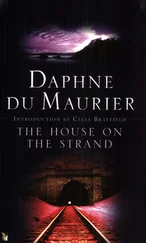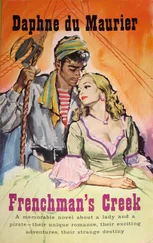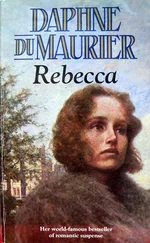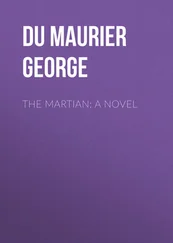Daphne du Maurier - The Apple Tree - a short novel & several long stories
Здесь есть возможность читать онлайн «Daphne du Maurier - The Apple Tree - a short novel & several long stories» весь текст электронной книги совершенно бесплатно (целиком полную версию без сокращений). В некоторых случаях можно слушать аудио, скачать через торрент в формате fb2 и присутствует краткое содержание. Жанр: Современная проза, Триллер, Социально-психологическая фантастика, на английском языке. Описание произведения, (предисловие) а так же отзывы посетителей доступны на портале библиотеки ЛибКат.
- Название:The Apple Tree: a short novel & several long stories
- Автор:
- Жанр:
- Год:неизвестен
- ISBN:нет данных
- Рейтинг книги:5 / 5. Голосов: 1
-
Избранное:Добавить в избранное
- Отзывы:
-
Ваша оценка:
- 100
- 1
- 2
- 3
- 4
- 5
The Apple Tree: a short novel & several long stories: краткое содержание, описание и аннотация
Предлагаем к чтению аннотацию, описание, краткое содержание или предисловие (зависит от того, что написал сам автор книги «The Apple Tree: a short novel & several long stories»). Если вы не нашли необходимую информацию о книге — напишите в комментариях, мы постараемся отыскать её.
The Apple Tree: a short novel & several long stories — читать онлайн бесплатно полную книгу (весь текст) целиком
Ниже представлен текст книги, разбитый по страницам. Система сохранения места последней прочитанной страницы, позволяет с удобством читать онлайн бесплатно книгу «The Apple Tree: a short novel & several long stories», без необходимости каждый раз заново искать на чём Вы остановились. Поставьте закладку, и сможете в любой момент перейти на страницу, на которой закончили чтение.
Интервал:
Закладка:
He looked inside the toolshed, outside the back door. Nothing there of much use. A spade was too heavy, and a fork no good. He took the hoe. It was the only possible tool, and light enough to carry.
He started walking up the lane to the 'bus stop, and now and again glanced back over his shoulder.
The gulls had risen higher now, their circles were broader, wider, they were spreading out in huge formation across the sky.
He hurried on; although he knew the 'bus would not come to the top of the hill before four o'clock he had to hurry. He passed no one on the way. He was glad of this. No time to stop and chatter.
At the top of the hill he waited. He was much too soon. There was half an hour still to go. The east wind came whipping across the fields from the higher ground. He stamped his feet and blew upon his hands. In the distance he could see the clay hills, white and clean, against the heavy pallor of the sky. Something black rose from behind them, like a smudge at first, then widening, becoming deeper, and the smudge became a cloud, and the cloud divided again into five other clouds, spreading north, east, south and west, and they were not clouds at all; they were birds. He watched them travel across the sky, and as one section passed overhead, within two or three hundred feet of him, he knew, from their speed, they were bound inland, up country, they had no business with the people here on the peninsula. They were rooks, crows, jackdaws, magpies, jays, all birds that usually preyed upon the smaller species; but this afternoon they were bound on some other mission.
"They've been given the towns," thought Nat, "they know what they have to do. We don't matter so much here. The gulls will serve for us. The others go to the towns."
He went to the call-box, stepped inside and lifted the receiver. The exchange would do. They would pass the message on.
"I'm speaking from Highway," he said, "by the 'bus stop. I want to report large formations of birds travelling up country. The gulls are also forming in the bay."
"All right," answered the voice, laconic, weary.
"You'll be sure and pass this message on to the proper quarter?"
"Yes… yes…" Impatient now, fed-up. The buzzing note resumed.
"She's another," thought Nat, "she doesn't care. Maybe she's had to answer calls all day. She hopes to go to the pictures tonight. She'll squeeze some fellow's hand, and point up at the sky, and 'Look at all them birds!' She doesn't care."
The 'bus came lumbering up the hill. Jill climbed out and three or four other children. The 'bus went on towards the town.
"What's the hoe for, Dad?"
They crowded around him, laughing, pointing. "I just brought it along," he said. "Come on now, let's get home. It's cold, no hanging about. Here, you. I'll watch you across the fields, see how fast you can run."
He was speaking to Jill's companions who came from different families, living in the council houses. A short cut would take them to the cottages.
"We want to play a bit in the lane," said one of them.
"No, you don't. You go off home, or I'll tell your mammy."
They whispered to one another, round-eyed, then scuttled off across the fields. Jill stared at her father, her mouth sullen. "We always play in the lane," she said.
"Not tonight, you don't," he said. "Come on now, no dawdling."
He could see the gulls now, circling the fields, coming in towards the land. Still silent. Still no sound.
"Look, Dad, look over there, look at all the gulls."
"Yes. Hurry, now."
"Where are they flying to? Where are they going?"
"Up country, I dare say. Where it's warmer."
He seized her hand and dragged her after him along the lane.
"Don't go so fast. I can't keep up."
The gulls were copying the rooks and crows. They were spreading out in formation across the sky. They headed, in bands of thousands, to the four compass points.
"Dad, what is it? What are the gulls doing?"
They were not intent upon their flight, as the crows, as the jackdaws had been. They still circled overhead. Nor did they fly so high. It was as though they waited upon some signal. As though some decision had yet to be given. The order was not clear.
"Do you want me to carry you, Jill? Here, come pick-a-back."
This way he might put on speed; but he was wrong. Jill was heavy. She kept slipping. And she was crying too. His sense of urgency, of fear, had communicated itself to the child.
"I wish the gulls would go away. I don't like them. They're coming closer to the lane."
He put her down again. He started running, swinging Jill after him. As they went past the farm turning he saw the farmer backing his car out of the garage. Nat called to him.
"Can you give us a lift?" he said.
"What's that?"
Mr. Trigg turned in the driving seat and stared at them. Then a smile came to his cheerful, rubicund face.
"It looks as though we're in for some fun," he said. "Have you seen the gulls? Jim and I are going to take a crack at them. Everyone's gone bird crazy, talking of nothing else. I hear you were troubled in the night. Want a gun?"
Nat shook his head.
The small car was packed. There was just room for Jill, if she crouched on top of petrol tins on the back seat.
"I don't want a gun," said Nat, "but I'd be obliged if you'd run Jill home. She's scared of the birds."
He spoke briefly. He did not want to talk in front of Jill.
"O.K.," said the farmer, "I'll take her home. Why don't you stop behind and join the shooting match? We'll make the feathers fly."
Jill climbed in, and turning the car the driver sped up the lane. Nat followed after. Trigg must be crazy. What use was a gun against a sky of birds?
Now Nat was not responsible for Jill he had time to look about him. The birds were circling still, above the fields. Mostly herring gull, but the black-backed gull amongst them. Usually they kept apart. Now they were united. Some bond had brought them together. It was the black-backed gull that attacked the smaller birds, and even new-born lambs, so he'd heard. He'd never seen it done. He remembered this now, though, looking above him in the sky. They were coming in towards the farm. They were circling lower in the sky, and the black-backed gulls were to the front, the black-backed gulls were leading. The farm, then, was their target. They were making for the farm.
Nat increased his pace towards his own cottage. He saw the farmer's car turn and come back along the lane. It drew up beside him with a jerk.
"The kid has run inside," said the farmer. "Your wife was watching for her. Well, what do you make of it? They're saying in town the Russians have done it. The Russians have poisoned the birds."
"How could they do that?" asked Nat.
"Don't ask me. You know how stories get around. Will you join my shooting match?"
"No, I'll get along home. The wife will-be worried else."
"My missus says if you could eat gull, there'd be some sense in it," said Trigg, "we'd have roast gull, baked gull, and pickle 'em into the bargain. You wait until I let off a few barrels into the brutes. That'll scare 'em."
"Have you boarded your windows?" asked Nat.
"No. Lot of nonsense. They like to scare you on the wireless. I've had more to do today than to go round boarding up my windows."
"I'd board them now, if I were you."
"Garn. You're windy. Like to come to our place to sleep?"
"No, thanks all the same."
"All right. See you in the morning. Give you a gull breakfast."
The farmer grinned and turned his car to the farm entrance. Nat hurried on. Past the little wood, past the old barn, and then across the stile to the remaining field. As he jumped the stile he heard the whir of wings. A black-backed gull dived down at him from the sky, missed, swerved in flight, and rose to dive again. In a moment it was joined by others, six, seven, a dozen, black-backed and herring mixed. Nat dropped his hoe. The hoe was useless. Covering his head with his arms he ran towards the cottage. They kept coming at him from the air, silent save for the beating wings. The terrible, fluttering wings. He could feel the blood on his hands, his wrists, his neck. Each stab of a swooping beak tore his flesh. If only he could keep them from his eyes. Nothing else mattered. He must keep them from his eyes. They had not learnt yet how to cling to a shoulder, how to rip clothing, how to dive in mass upon the head, upon the body. But with each dive, with each attack, they became bolder. And they had no thought for themselves. When they dived low and missed, they crashed, bruised and broken, on the ground. As Nat ran he stumbled, kicking their spent bodies in front of him.
Читать дальшеИнтервал:
Закладка:
Похожие книги на «The Apple Tree: a short novel & several long stories»
Представляем Вашему вниманию похожие книги на «The Apple Tree: a short novel & several long stories» списком для выбора. Мы отобрали схожую по названию и смыслу литературу в надежде предоставить читателям больше вариантов отыскать новые, интересные, ещё непрочитанные произведения.
Обсуждение, отзывы о книге «The Apple Tree: a short novel & several long stories» и просто собственные мнения читателей. Оставьте ваши комментарии, напишите, что Вы думаете о произведении, его смысле или главных героях. Укажите что конкретно понравилось, а что нет, и почему Вы так считаете.
